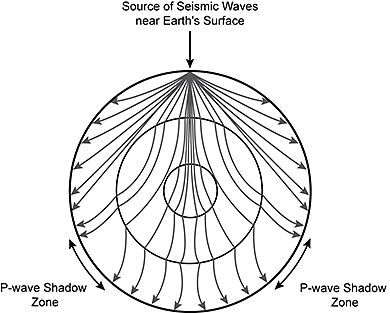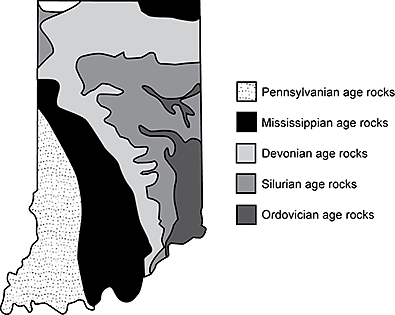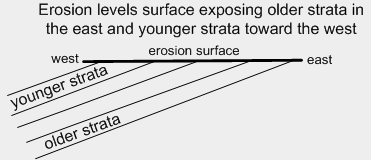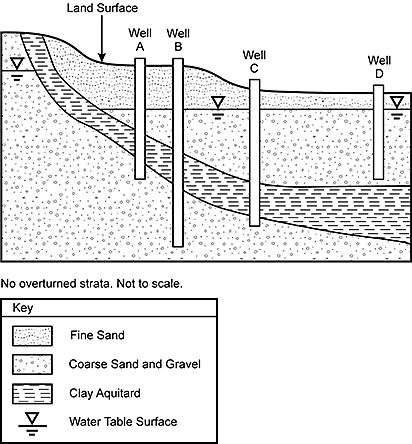Study Guide
Field 044: Science—Earth/Space Science
Sample Multiple-Choice Questions
Objective 0001
The Nature and Processes of Science (Standard 1)
1. A climatologist analyzes historical data and hypothesizes that the dramatic reduction in the extent of sea ice in the Arctic compared with the long-term average is increasing the frequency of large dips in the jet stream during the summer and fall. These dips in the jet stream often bring contrasting air masses in contact, which can be a factor in the development of extreme weather events. Other scientists strongly criticize the climatologist's hypothesis, stating that dips in the jet stream are common and the increased incidence of extreme weather is just due to chance. Which of the following additional types of information would provide the strongest support for the climatologist's hypothesis?
- current evidence showing that when the jet stream flow dips southward or northward, extreme weather events are more likely to occur
- results from a climate modeling study showing that changes in average temperatures and the extent of sea ice in the Arctic could affect the flow of the jet stream
- a hypothesis describing a possible mechanism that connects seasonal changes in sea ice to changes in the flow of the jet stream
- evidence that shows a consistent correlation between periods of low sea ice and an increased frequency in the development of large dips in the jet stream's flow
- Answer
-
Correct Response: D.
This question requires the examinee to demonstrate knowledge of the formulation of testable hypotheses and the principles and procedures for designing and conducting scientific investigations. Since climate is a highly complex system, the specific mechanisms responsible for a change in the climate system are often not determined. Correlations that show a consistent relationship between one part of the climate system (e.g., Arctic sea ice) and another (e.g., fluctuations in the path of the jet stream), however, are considered valuable evidence for determining how different parts of the climate system interact. For this reason, if a climatologist demonstrates that a correlation exists between sea-ice extent and the frequency of dips in the jet stream over many years, it provides strong evidence supporting the relationship between these two phenomena.
Objective 0002
Central Concepts and Connections in Science (Standard 2)
2. Which of the following characteristics is shared by both good electrical conductors and good heat conductors?
- free movement of electric charges between adjacent atoms
- close packing of electron shells surrounding the atomic nuclei
- net positive electric charge that promotes the flow of electrons
- covalent bonds that share electrons between adjacent atoms
- Answer
-
Correct Response: A.
This question requires the examinee to demonstrate knowledge of the basic concepts and major principles of physical science. It is not a coincidence that certain materials, such as silver and copper, which are good conductors of electricity, are also good conductors of heat. Metallic bonding is responsible for the conductive nature of these materials. These types of conductive metals are made up of a lattice of metal atoms whose outer shell electrons are free to move throughout the lattice. The conduction of heat in conductive metals occurs through the transfer of kinetic energy from collisions between adjacent atoms and as a result of the collisions between delocalized electrons.
Objective 0003
Stars, Galaxies, and the Universe (Standard 3)
3. An important feature of Big Bang cosmology that is supported by observational astronomy is that the universe:
- is increasing its total mass over time.
- contains a great deal of dark matter.
- formed from an earlier collapsed universe.
- is expanding at an accelerating rate.
- Answer
-
Correct Response: D.
This question requires the examinee to demonstrate knowledge of the Big Bang theory of the universe's origin, evidence supporting the Big Bang theory, the scale and evolution of the universe, and Hubble's law. The Big Bang theory states that the universe began with a massive release of energy that initiated the expansion of space and the formation of matter. Using spectral analysis of extremely distant objects in the universe, astronomers have shown that the expansion of the universe that began with the Big Bang has continued and that the rate of expansion is accelerating.
Objective 0003
Stars, Galaxies, and the Universe (Standard 3)
4. Pulsars are stars that give off precisely spaced bursts of radiation. Which of the following is responsible for this phenomenon?
- The strong magnetic field of a neutron star causes it to emit radiation in two narrow beams that sweep by Earth as the star spins.
- The presence of a neutron star orbiting very close to the pulsar causes a recurring increase in the pulsar's energy output.
- The buildup and collapse of a neutron star's magnetic field repels and attracts ionized gases on the star's surface.
- The low mass of a pulsar produces alternating cycles of nuclear fusion and chemical burning that release different amounts of energy.
- Answer
-
Correct Response: A.
This question requires the examinee to demonstrate knowledge of the Hertzsprung-Russell diagram, characteristics and life cycles of different types of stars, and the nucleosynthesis of elements. Pulsars are spinning neutron stars that produce beams of radiation that hit Earth in precisely spaced pulses each time the star spins. The strong magnetic field of a pulsar causes emitted radiation to be in two narrow zones aligned with the star's magnetic field. As the star spins, these beams of radiation sweep over Earth at regular intervals, making the star's emitted energy appear to pulsate.
Objective 0004
Earth and the Solar System (Standard 4)
5. The differences between Earth's atmosphere and the atmospheres of the other terrestrial planets are primarily due to:
- Earth's axial tilt and its surface reflectivity.
- the elliptical shape and velocity of Earth's orbit.
- Earth's size and its distance from the sun.
- the strength and orientation of Earth's magnetic field.
- Answer
-
Correct Response: C.
This question requires the examinee to demonstrate knowledge of the nebular theory of the solar system's origin. The four terrestrial planets have very different surfaces, interiors, and atmospheres. Astronomers theorize that these differences are a result of the terrestrial planets' different sizes (and consequently their different masses) and the distance they are from the sun. These variables in turn control the factors that created the different atmospheres of Venus, Earth, and Mars or, as in the case of Mercury, left it with no atmosphere. The mass and size of a planet affects its internal temperature and thus the amount of tectonic and volcanic activity—a major source of atmospheric gases. A planet's size and mass also affect a planets' ability to retain gases by gravitational attraction. Distance from the sun affects the amount of solar energy reaching the terrestrial planets and this affects the presence and state of water and other gases in their atmospheres. The presence of liquid water on Earth, for example, appears to be responsible for removing some carbon dioxide from the Earth's early atmosphere and supporting the development of photosynthetic organisms—the primary source of oxygen in Earth's unique atmosphere.
Objective 0005
Earth's Origin, Evolution, and Structure (Standard 5)
6. Use the information below to answer the question that follows.

The refraction of seismic waves as they travel from the location of an earthquake through Earth's interior creates a P-wave shadow zone, as shown in the diagram. The existence of the P-wave shadow zone primarily provides evidence for which of the following?
- convection currents in the lower mantle
- a liquid outer core
- plastic flow in the upper mantle
- a solid inner core
- Answer
-
Correct Response: B.
This question requires the examinee to demonstrate knowledge of Earth's internal structure and the properties and physical and chemical characteristics of Earth's layered interior. The P-wave shadow zone exists because as P-waves cross the boundary between the lower mantle and outer core, they are refracted due to the change in viscosity at the interface between these two layers. The behavior of P-waves at the interface indicates that the outer core is liquid. The fact that S-waves are not able to pass through the outer core also indicates that this layer is liquid.
Objective 0005
Earth's Origin, Evolution, and Structure (Standard 5)
7. Index fossils are important diagnostic tools for relative dating and correlating geologic strata. Which of the following characteristics of an extinct species would make it a useful index fossil?
- slow evolutionary development in a unique but stable environmental setting
- a long period of minimal evolutionary change in a variety of different habitats
- wide geographic distribution over a relatively short period of geologic time
- a specialized adaptation to a specific ecosystem during a particular geologic era
- Answer
-
Correct Response: C.
This question requires the examinee to demonstrate knowledge of the principles and applications of radiometric dating, relative dating, and stratigraphy. Index fossils are so named because they are useful for establishing the relative age of the geologic deposits in which they are found. An index fossil differs from other fossils in that the species of organism from which the fossil formed existed for a relatively short period of geologic time (i.e., a few hundreds of thousands of years) and had a wide geographic extent. These attributes mean that sedimentary rock strata containing a particular index fossil can be correlated to sedimentary rock strata in other parts of the world that contain the same index fossil. In this way, sedimentary rock strata that are part of well-dated geologic sequences can be used to establish the relative age of other geologic deposits containing the index fossil.
Objective 0006
Earth Processes and Materials (Standard 6)
8. Which of the following is a property of quartz that is a major cause for its predominance in river sands and other noncoastal inland settings?
- low melting point
- high tendency to fracture
- high specific gravity
- low chemical reactivity
- Answer
-
Correct Response: D.
This question requires the examinee to demonstrate knowledge of the characteristics, identification, and composition of rocks and minerals, including the rocks and minerals of Indiana. Quartz (SiO2) is composed of one silicon atom and two oxygen atoms. Quartz has a three-dimensional framework in which oxygen is completely shared by adjacent silicon atoms. This means that all the bonds in quartz are of the strong silicon-oxygen type, giving quartz its low chemical reactivity, resistance to chemical weathering, and hardness.
Objective 0006
Earth Processes and Materials (Standard 6)
9. Use the information below to answer the question that follows.

The generalized bedrock geologic map of Indiana shows that over the southern half of the state the youngest rocks are exposed to the west while the bedrock becomes increasingly older toward the east. Which of the following best describes the cause of this geographic trend in the age of bedrock deposits?
- Bedrock in the west was more resistant to erosion.
- Eastern areas were more heavily eroded by glaciers.
- Bedrock strata are tilted downward toward the west.
- Western strata have been thrust over eastern strata.
- Answer
-
Correct Response: C.
This question requires the examinee to demonstrate knowledge of weathering, erosion, and deposition. The generalized bedrock geologic map of Indiana shows that the oldest strata are located in the easternmost part of the state, while the age of bedrock deposits becomes increasingly younger toward the west. Since the bedrock strata of Indiana have not been overturned, older strata are on the bottom with increasingly younger strata toward the top. The bedrock strata are tilted toward the west and as erosion leveled the region, the younger layers that were on the top in the eastern part of the state were eroded away, leaving older strata exposed in the eastern part of the state and increasingly younger strata toward the west.

Objective 0007
Biogeochemical Cycles, Geologic Resources, and the Environment (Standard 9)
10. If current climate trends continue, the average global temperature of the troposphere is expected to increase significantly in the coming decades. Under this type of warming scenario, which of the following changes in the carbon cycle will trigger the most significant positive feedback, further increasing the temperature of the troposphere?
- Warming of the ocean surface will increase the biological productivity of marine phytoplankton in high-latitude regions.
- Melting of permafrost in arctic regions will increase the biological breakdown of previously frozen organic matter.
- Lessening of the temperature gradient between low and high latitudes will spread vegetation into previously barren regions.
- Warming of the deep ocean will cause the breakdown of methane clathrates buried in the sediments of the ocean floor.
- Answer
-
Correct Response: B.
This question requires the examinee to demonstrate knowledge of the physical and chemical processes of the carbon cycle and its relationship to human activities, the climate system, and ocean chemistry. The melting of permafrost in arctic regions will increase the breakdown of organic matter in the permafrost layer that has been frozen for thousands of years. As this organic material is broken down by microbes, methane is generated. This is a natural process in the Arctic, but melting of the permafrost greatly increases both the rate at which the process occurs and the amount of biomass available for decomposition. Methane is an extremely potent greenhouse gas and so its increased release into the atmosphere is expected to increase the temperature of the atmosphere, which in turn will cause more permafrost to melt and more methane to be released in a classic positive feedback loop.
Objective 0008
Freshwater Systems and the Oceans (Standard 7)
11. A camper in the Rocky Mountains at an elevation of 10,000 feet is boiling water for cooking pasta. Which of the following best describes why the pasta will not cook at the same rate at this elevation as at a lower elevation?
- The lower molecular mass of atmospheric gases increases the boiling point of water.
- The kinetic energy of water molecules is reduced relative to the kinetic energy of air molecules.
- The equilibrium vapor pressure of water is directly related to the atmospheric pressure.
- The condensation rate of water vapor increases as the density of atmospheric gases decreases.
- Answer
-
Correct Response: C.
This question requires the examinee to demonstrate knowledge of the physical and chemical properties of water. The boiling point of water is the temperature at which the water's equilibrium vapor pressure equals the surrounding atmospheric pressure. Since the average atmospheric pressure decreases with increased elevation, less energy input is needed to reach water's equilibrium vapor pressure at an elevation of 10,000 feet. This means that water boiling in an open container high in the Rocky Mountains will not be as hot as it would be at sea level, requiring additional cooking time for foods like pasta.
Objective 0008
Freshwater Systems and the Oceans (Standard 7)
12. Use the information below to answer the question that follows.

In the geologic cross section shown, four wells have been drilled into two aquifers separated by an aquitard. Water can only enter from the bottom of the wells. Given the location of the wells and the hydrogeologic conditions, which of the wells is most likely a free-flowing artesian well?
- Well A
- Well B
- Well C
- Well D
- Answer
-
Correct Response: C.
This question requires the examinee to demonstrate knowledge of groundwater aquifers, watersheds, and groundwater flow processes. A well drilled into an aquifer will be a free-flowing artesian well if the water table surface is above the top of the well. In the geologic cross section, only Well C has been drilled in a location such that the top of the well is below the water table surface of the aquifer from which it is drawing water (i.e., the lower aquifer in the cross section). Since water enters the wells at the bottom, only Well C draws water from the lower aquifer and has its top below the water table surface of that aquifer.
Objective 0009
The Atmosphere, Weather, and Climate (Standard 8)
13. Which of the following best describes how most of the harmful high-frequency ultraviolet radiation from the sun is blocked by the atmosphere before it reaches Earth's surface?
- The lower troposphere contains particulates that reflect ultraviolet radiation.
- The thermosphere contains electrically charged particles that deflect ultraviolet radiation.
- The upper troposphere contains water droplets that refract ultraviolet radiation.
- The stratosphere contains a layer of concentrated ozone that absorbs ultraviolet radiation.
- Answer
-
Correct Response: D.
This question requires the examinee to demonstrate knowledge of the structure, composition, and properties of the atmosphere's different layers. The ozone layer in the stratosphere is composed of a region of relatively concentrated ozone (O3) molecules that absorb ultraviolet radiation with wavelengths between approximately 200 to 310 nanometers—the UV-B range. Aside from damaging plants and causing sunburn, this type of ultraviolet radiation can cause genetic mutations and skin cancer.
Objective 0009
The Atmosphere, Weather, and Climate (Standard 8)
14. Many of Earth's driest climate regions are located within several degrees of 30° north and south latitude. The very low annual average precipitation near this latitude of the subtropics primarily results from:
- heating of the ground surface by solar energy.
- sinking of cool and dry air aloft that creates high pressure.
- removal of moist air masses by the trade winds.
- drying out of air masses as they rise into the cold air aloft.
- Answer
-
Correct Response: B.
This question requires the examinee to demonstrate knowledge of the global climate system, changes in climate over geologic time, and recent climate change. The low-precipitation regions that typify land areas at approximately 30º north and south are known as subtropical high-pressure ridges. These two belts of high pressure are formed when air at the equator rises and then flows north and south until it eventually sinks back toward the surface in a circulation pattern known as a Hadley Cell. As the air rises at the equator, it loses some of its moisture in the form of equatorial precipitation. The subsidence of this now relatively dry air at approximately 30° north and south latitudes causes it to warm adiabatically, creating land areas with hot dry conditions.
Objective 0010
Science Instruction and Assessment (Standard 10)
15. As part of the Earth and space science curriculum, a science teacher is planning to have weekly discussions on policy issues associated with content being covered in class. The teacher plans to initiate the activity by writing several open-ended questions on the board and asking students to respond to the questions with answers, comments, or additional questions. Which of the following strategies would most effectively help those students who are uncomfortable speaking in public benefit from this activity?
- breaking the class into small discussion groups that elect a spokesperson to present their ideas or responses
- having students respond as part of the discussion activity through exit slips, online forums, or interactive journals
- designating two different students each week to lead the discussion as part of a class participation requirement
- requiring students to write an essay after the discussion to evaluate their understanding of the questions and related content
- Answer
-
Correct Response: B.
This question requires the examinee to demonstrate knowledge of strategies and skills for planning and designing science instruction, including the use of techniques and approaches that meet the needs of diverse learners. In the activity described a teacher wants to encourage students to share comments, ideas, and questions relevant to the policy issues that relate to Earth and space science content. A good way to elicit this kind of interactive communication with students in general, but especially students who are shy speaking in public, is to have the students use exit slips, interactive journals, or online forums to communicate about the topics under discussion.
